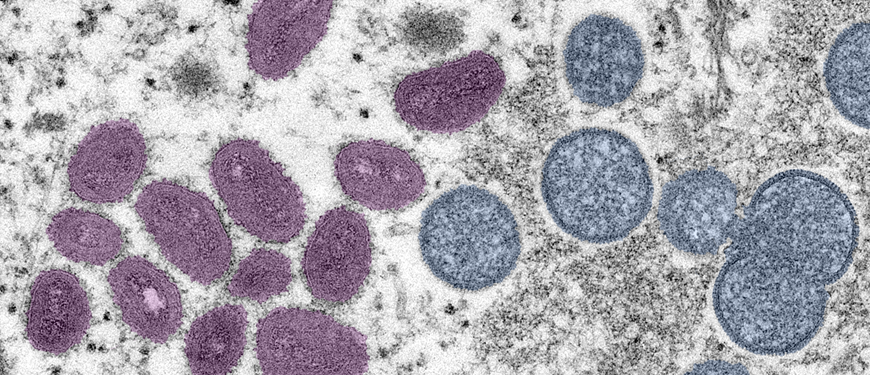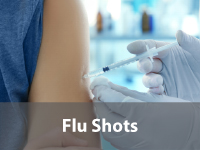Mpox

Healthcare providers who suspect mpox in a patient should report immediately to DPH by calling
1-866-PUB-HLTH (1-866-782-4584).
For additional reporting options, visit our Epidemiology page.
What is Mpox?
Mpox is a rare disease caused by infection with the mpox virus. Monkeypox virus is part of the same family of viruses as variola virus, the virus that causes smallpox. This family of viruses include vaccinia virus and the cowpox virus. Mpox is not related to chickenpox.
Mpox was discovered in 1958 when two outbreaks of a pox-like disease occurred in colonies of monkeys kept for research. The source of the disease remains unknown. However, African rodents and non-human primates (like monkeys) might harbor the virus and infect people.
The first human case of mpox was recorded in 1970. Prior to the 2022 outbreak, mpox had been reported in people in several central and western African countries. Previously, almost all mpox cases in people outside of Africa were linked to international travel to countries where the disease commonly occurs or through imported animals. These cases occurred on multiple continents.
2022 Mpox Outbreak
In 2022, countries that do not normally experience mpox outbreaks began to report a rise in cases. Eventually, the illness was detected in the United States and later in Georgia. Early data on the current global outbreak suggest that gay, bisexual and other men who have sex with men make up the majority of cases, but it is important to note that anyone who has close contact with someone with mpox is at risk for infection.
Mpox Vaccine
Currently, vaccine supply is limited across the country and every state is awaiting more vaccine allocations from our federal agencies. At this time, mpox vaccination is available at two North Central Health District county health departments by appointment:
- Houston County Health Department: Tuesdays, 8 a.m. – 12 p.m.
- Baldwin County Health Department: Thursdays, 8 a.m. – 12 p.m.
Because mpox vaccine supply remains limited, you will be asked to answer a series of questions that help DPH prioritize vaccine to individuals who may have been exposed to mpox. The questions follow guidance from the Centers for Disease Control and Prevention for administering mpox vaccine.
Mpox Testing
People who think they have mpox or have had close personal contact with someone who has mpox should contact a healthcare provider to help them decide if they need to be tested for mpox. All 13 NCHD county health departments are able to test for mpox by appointment. Contact your local health department to schedule testing. PLEASE NOTE: testing is only possible if the rash associated with mpox is present.
Transmission
Mpox spreads in different ways. The virus can spread person-to-person through:
- Direct Contact with infectious rash, scabs, or body fluids
- Respiratory secretions/droplets during prolonged, face-to-face contact or during intimate physical contact, such as kissing, cuddling or sex
- Touching items, like clothes or bedding, that touch infectious rashes or body fluids
- A pregnant mother to the fetus through the placenta
Mpox can spread from the time symptoms start until the rash has fully healed and a fresh layer of skin has formed (patients are to remain on isolation until a fresh layer of skin forms). People who do not have mpox symptoms cannot spread the virus to others. Currently, it is not known if monkeypox can spread through semen or vaginal fluids.
It’s also possible for people to get monkeypox from infected animals, either by being scratched or bitten by the animal or by preparing or eating meat or using products from an infected animal.
Symptoms
Mpox symptoms are similar to smallpox symptoms, but milder; and mpox is rarely fatal. Symptoms are similar to a variety of illnesses and can include:
- Fever or chills
- Swollen lymph nodes
- Muscle pain
- Headache
- Exhaustion
A major symptom of mpox is the associated rash that can look like pimples or blisters that appears on the face, in the mouth and on other parts of the body like hands, feet, chest, genitals or anus. The rash goes through stages before healing completely. To see examples of the rash, visit CDC’s mpox symptoms page.
Symptoms usually last 2 – 4 weeks, but the time can vary based on other factors. Severity of illness can depend on factors including the health of the individual, the route of exposure, any simultaneous illnesses or chronic medical conditions and the strain of the virus.
While severe illness and death is rare in most cases, children have a higher risk of severe outcomes based on previous outbreaks of mpox.
Prevention
Protect Yourself
You can take steps to protect against the virus:
- Avoid close, skin-to-skin contact with people who have a rash that looks like mpox.
- Do not touch the rash or scabs of a person with mpox.
- Do not kiss, hug, cuddle or have sex with someone with mpox.
- Do not share eating utensils or cups with a person with mpox.
- Do not handle or touch the bedding, towels, or clothing of a person with mpox.
- Wash your hands often with soap and water or use an alcohol-based hand sanitizer.
- In Central and West Africa, avoid contact with animals that can spread mpox virus, usually rodents and primates. Also, avoid sick or dead animals, as well as bedding or other materials they have touched.
Protect Others
You can help reduce the risk of mpox. If you have symptoms of mpox:
- Isolate at home
- If you have an active rash or other symptoms, stay in a separate room or area away from people or pets you live with, when possible.
Vaccination
Currently, vaccine supply is limited across the country and every state is awaiting more vaccine allocations from our federal agencies. At this time, mpox vaccination is available at two North Central Health District county health departments by appointment:
- Houston County Health Department: Tuesdays, 8 a.m. – 12 p.m.
- Baldwin County Health Department: Thursdays, 8 a.m. – 12 p.m.
To register for mpox vaccination at either location, visit DPH’s Vaccination Appointment website or call the Vaccine Scheduling Resource Line at (888) 457-0186. The scheduling tool allows you to choose a first or second dose of Jynneos™ mpox vaccine from a dropdown menu. Because mpox vaccine supply remains limited, you will be asked to answer a series of questions that help DPH prioritize vaccine to individuals who may have been exposed to mpox. The questions follow guidance from the Centers for Disease Control and Prevention for administering mpox vaccine.
CDC recommends vaccination for people who have been exposed to mpox and people who are at higher risk of being exposed to mpox, including:
- Persons of any gender identity or sexual orientation with any of the following:
- Have had multiple or anonymous sex partners with men who have sex with men in the last 14 days
- Have had skin-to-skin or intimate contact (e.g., kissing, hugging) with persons who have had a rash or are suspected of having mpox in the last 14 days.
- Have had skin-to-skin or intimate contact (e.g., kissing, hugging) with persons at large venues or events in the past 14 days.
- Have engaged in commercial and/or transactional sex in the past 14 days (e.g., sex in exchange for money, shelter, food, and other goods or needs)
- Are HIV positive, or on HIV PrEP, or diagnosed with a sexually transmitted infection (STI) in the last 90 days.
Guidance Documents:
- Georgia Department of Public Health
- Centers for Disease Control & Prevention:
Learn about our related health services:
Additional Resources


 Contact Us
Contact Us Locations
Locations Job Openings at North Central Health District
Job Openings at North Central Health District Internships
Internships Board of Health
Board of Health Cost and Insurance
Cost and Insurance Privacy Policy
Privacy Policy Teens & Adults
Teens & Adults For Children
For Children Other Programs
Other Programs County Environmental Health Offices
County Environmental Health Offices Chemical Hazards
Chemical Hazards Tourist Accommodations
Tourist Accommodations Food Service
Food Service Rabies Control
Rabies Control Lead Poisoning Prevention
Lead Poisoning Prevention Body Art
Body Art Land Use
Land Use Swimming Pool Program
Swimming Pool Program Water Testing for Private Wells
Water Testing for Private Wells Environmental Health Complaints
Environmental Health Complaints Georgia Food Recall Alerts
Georgia Food Recall Alerts Personal & Family Preparedness
Personal & Family Preparedness Emergency Preparedness for Functional & Access Needs
Emergency Preparedness for Functional & Access Needs Severe Weather Preparedness
Severe Weather Preparedness Emergency Preparedness Training
Emergency Preparedness Training Medical Reserve Corps
Medical Reserve Corps Regional Healthcare Coalitions
Regional Healthcare Coalitions Strategic National Stockpile/Medical Countermeasures
Strategic National Stockpile/Medical Countermeasures

